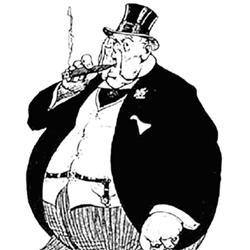
The vast majority of golf pros provide a valuable service to their clubs and one that new chairmen often don’t recognise, argues Eddie Bullock.
There was a gathering of great golf industry minds recently and talk was whether we should be in or out of Europe, how golf participation was going to grow, why course designers seem to be obsessed with adding more length to courses and what to do about the speed of play. Then I was told some shocking news about one of our most respected club professionals who had made a huge contribution to his club and golf community: out of the blue a new ‘big cheese’ chairman arrived and said, ‘This is it my old son! It is time for a change. We can operate the shop, thanks for the last ten years of service.’
So the new chairman arrives with his city ideas. I am sure that behind closed doors, or maybe on the fifteenth fairway, the mutterings start, then they become more serious as the big cheese convinces his mates that this is the way to go, that the retail opportunities for the club will be so lucrative and, as membership is declining, this will make great savings for the club. The execution jury deliver the negatives to the main committee and then the downward spiral of comments turn into cynicism and anger and many became convinced that the pro should leave as, ‘it’s time for a change.’
Of course I can understand why one would look to review certain sectors of the business to make potential savings or to refine the service. All businesses should do this. However, ignorance, lack of understanding and misinformation can place the club in a very vulnerable position. I have spent most of my adult life in the golf business, working with proprietary and non-proprietary clubs helping them to deliver a consistent and efficient business. I know what makes them tick and I know how the majority communicate – or don’t, as it often the case.
In my opinion, a first class club professional is a substantial asset to the progressive golf club, particularly a traditional members’ club; it is a short-sighted club who fail to properly support a good pro. The successful modern day professional is today generally far more enterprising than perhaps was the case in the past in terms of delivering an all-round service to their membership; they are tuned in to all aspects of providing a well-stocked retail operation and many have made a significant investment in all aspects of the latest technological teaching gadgets. Many will also provide additional services, such as starting the membership for their events, being up at dawn for the Chairman’s annual golf day, administering competitions, being responsible for green fees and acting as the main meeter and greeter.
Without a good pro clubs would need additional qualified staff and, while I am ranting on, many of the club members will have no idea that as an ambitious and proud PGA member, one must invest into their own continuous professional development programme to deliver and enhance the service to the membership and guests. By the time one has paid a salary to their assistants, had to stock the extensive range of merchandise, (and be rest assured the benefits of sale-of-return disappeared in bygone days) and invested a few quid into maintenance, most pros won’t be making enough to buy that luxury villa in the South of France.
So Mr big cheese, have you really thought this through? A first class golf professional is a reliable asset; in the summer they will dedicate themselves up to sixty hours plus – if you worked out their rate per hour it would be very low. Also, would a new member of staff want to attend all the boring social events that our loyal first class professional knows it’s their professional duty to show their face at?
Let’s take this scenario a step further; has the club’s General Manger been consulted with this development? The new progressive general manager does wear many hats but, let me assure you, there are very few that have the required retail expertise, although this could be one of the next competencies that will be required for future golf club managers! Having harassed the previous first class professional out of their job would anyone really wish to follow? Ah! I may have jumped the gun as Mr big cheese may have considered a retail management group, which is an option, but is this really what you want?
I realise this is not an everyday occurrence and, unfortunately, there is still evidence of the other type of golf professional who believes the world in general owes him a living. There are some pros who have failed to change their behaviour and attitude in which to create the warm welcoming atmosphere that should be delivered as soon as you make contact, but these are now thankfully a dwindling minority.
The Professional’s shop is still regarded as the first ‘social hub’ of the club. The business of how and what a quality first class golf professional brings to the club can be the downfall or add to the buzz of the social golf culture. However life will go on; Mr big cheese will be in office for a limited period and then what legacy has he left? Bring back the slogan ‘Golfers That Know Buy From Their Pro.’ Ah, well I’m an old pro. Happy memories!
- Seven steps for golf club boards/committees, to enhance their knowledge and work towards creating an ultra productive club:
- Club boards/committees need to adopt a deeper understanding about the roles, responsibilities and positioning of all their management teams.
Club boards/committees need to fully understand the education development programmes of the relevant industry bodies which effects and contributes to their businesses, e.g.
Professional Golfers’ Association (PGA) – Golf Operations
Golf Club Mangers’ Association (GCMA) – General Business
British & International Golf Greenkeepers Association (BIGGA) – Golf Course
Institute of Hospitality (IOH) -Food & Beverage - Invest more boldly into the education and development of the club teams
- Conduct annual performance appraisals
- Invite the key drivers of the club business to attend board/committee meetings and share their future ideas and vision
- Are the service standards still relevant to the clubs business – or do they need updating?
- Don’t be shy to ask for independent industry knowledge!









